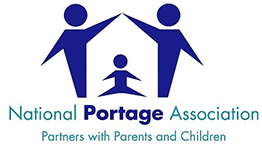Introduction
My name is Sarah Evans. I am a Portage Practitioner working in North Somerset. I am one member of a team of four practitioners. One person is full time, another works four and a half days a week; one works four days and the other two days. We are currently working with 52 families between us.
Phoebe was referred to the Portage Service by the Springboard Opportunity Group leader in May 2013. Phoebe was one year and ten months old. Phoebe did not have a diagnosis. She had a team of professionals working with her and her family, including Speech and Language Therapist, Physiotherapist and a Community Paediatrician.
An initial visit to Phoebe was made in July 2013. She was two years old. After her initial wariness of two strangers, she started to present as a happy child. During her early Portage sessions she smiled, laughed, loved adult attention, made good eye contact and joined in with the celebration of her success.
She was able to eye point to make a choice using objects of reference. Phoebe was able to feed herself bite and dissolve type foods. She ate pureed food fed by an adult. Phoebe used a corner seat to sit in. She showed her dislike of being placed on her tummy. Phoebe explored a variety of toys that were positioned next to her.
The Approach
Fortnightly visits began in September 2013. These became weekly in November 2013 and we are still continuing to visit. Initially a holistic assessment and observations through play, discussion with parents and other professionals was made to find out what Phoebe could do.
Long term goals covering a period of 4 months were set in partnership with the parents. These were cross referenced with targets set by other professionals who regularly (termly) joint visit with Portage.
Joint visits enable Phoebe and her parents to engage with other professionals in the relaxed environment of their own family home. The family only have to attend one appointment instead of two and only have to ‘tell their story’ (success and concerns) once. New skills that are being worked on can be modelled by the relevant practitioner and all parties can approach these targets in similar ways.
The aim of Portage is to empower parents; helping to build their confidence, so that they can deliver the small steps to learning. The achievement of the long term goals is celebrated with Phoebe and her family. Initial long term goals were set to build on her current baseline of skills:
Social and Emotional Development - Phoebe will make a choice by reaching out on 4/6 occasions.
Self help and Personnel Care - Phoebe will eat soft mashed foods fed by an adult on 2/3 occasions.
Cognitive- Play and Learning Skills - During action songs and rhymes Phoebe will touch her head on 3/5 occasions.
Physical Development - Phoebe will spend 5 minutes on her tummy three times daily.
Language and Communication Skills - In imitation, Phoebe will make long vowel sounds on 3/5 occasions.
As a Portage Home Visitor I receive monthly supervision with my line manager, during which we review my caseload. Work with this family has shown to be successful when looking at achievements of long term goals and parent satisfaction. Parents are asked at the end of each term if they wish Portage to continue.
Partnership Working and Outcomes
Phoebe, her parents and Portage have set four programmes of long term goals over the visiting period. This equates to 20 targets. 19 out of the 20 have been achieved and 1 is still in progress.
Parents reported at a recent multi-agency meeting that “working towards realistic targets has improved their own well being”. Prior to this they reported that they felt “unhappy, disappointed and unsure if progress would ever be made”.





